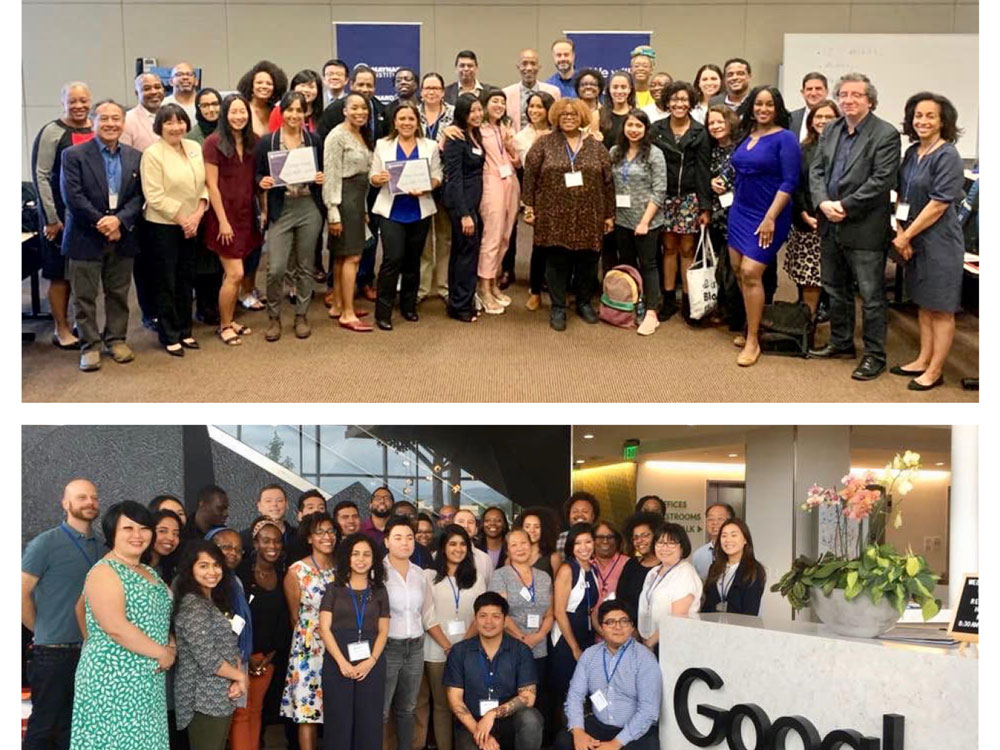Maynard Institute and Medill partner for Maynard 200 journalism fellowship
Medill will host the Maynard 200 program at Northwestern's San Francisco campus

The Maynard Institute for Journalism Education and Northwestern University Medill School of Journalism, Media, Integrated Marketing Communications announce their partnership for this year’s Maynard 200 journalism fellowship program, aligned in their mission to galvanize diversity in media and to bolster careers of more journalists of color nationwide.
Northwestern Medill will host the Maynard 200 place-based program in the Bay Area at its downtown San Francisco campus.
The fellowship aims to train 200 journalists of color in the United States by 2023.
It supports the next generation of storytellers, managers/leaders and media entrepreneurs of diverse backgrounds by providing relevant training courses, resources and mentorship for a year by distinguished media professionals and experts in various disciplines.
A majority of the estimated 40-member 2020 fellowship class will be recruited locally, and the rest will be chosen from a national pool of applicants.
Candidates can apply for one of three tracks — Storytelling, Advanced Leadership and Media Entrepreneurship. The deadline to apply is May 31, 2020.
Apply for the Maynard 200 Journalism Fellowship Program
Fellows are required to attend both sessions and to participate in the year-long mentorship and supplementary courses. Tuition is waived. National participants will be provided flight and hotel accommodations, and national and local participants will receive a weekly stipend primarily for transit costs.
“We couldn’t be more excited to rekindle our partnership with Northwestern, and to be able to do so in San Francisco is all the more fortuitous,” said Martin G. Reynolds, Maynard Institute co-executive director. “We are committed to helping support the next generation of journalism entrepreneurs, leaders and storytellers, and we know this great institution shares a similar goal and passion in service of its students. We look forward to collaborating with Northwestern’s faculty to infuse Maynard 200 with their wisdom and expertise.”
“For more than two decades, the Maynard Institute held its path-breaking Management Training Center at Northwestern’s Kellogg School of Management,” said Evelyn Hsu, the institute’s co-executive director. “We are pleased to be partners with the university again and look forward to recruiting speakers from Northwestern’s renowned faculty.”
“Medill is deeply committed to increasing diversity in all levels of media, and we’re delighted to share our faculty and space with Maynard to prepare journalists from across the country,” Medill Dean Charles Whitaker said. “These journalists will go back to their communities with an enhanced understanding of how to share rich reporting and insights with their readers, viewers and listeners.”
Maynard 200 Director Odette Alcazaren-Keeley said this year’s program cements the renewed alliance of the two institutions.
“In its third year, we see Maynard 200 as a catalyst in transforming the media landscape, especially in amplifying the voice, skills, growth and authentic power of diverse journalists,” she said. “We are once again creating a dynamic, vibrant curriculum and faculty roster to address the current needs of diverse media professionals.
“Since 2018, we have had the expertise of distinguished speakers and mentors from The Washington Post, The New York Times, Google News Lab, The Wall Street Journal, Associated Press, Los Angeles Times, ImpreMedia, ProPublica, USC Annenberg School for Communication and Journalism, USC Marshall School of Business, NBC, CBS, Reveal, and many other respected media and academic institutions. We look forward to having the knowledge and resources of Northwestern Medill's respected faculty, as well as of its academic affiliates and network of experts.
“We’re continuing our mission to expand access to training for more journalists of color representing the general market, diverse and community media, and to spark a mini-movement of diversity in the industry, that gives real power to them.”
Forty-nine Maynard 200 fellows representing mainstream and diverse media organizations and entrepreneurial ventures, as well as print, broadcast, online and multimedia portals, have participated to date from across the United States. They continue to express appreciation of the program.
“There is no experience like the experience of being a Maynard 200 fellow,” says Hélène Biandudi Hofer, a 2019 participant in the media entrepreneurship track. “From the support that you receive, the resources you’re given, the mentors that are there to help lead and guide you, the trainings, the workshops, webinars . . . and especially the family unit that is created with the other Maynard fellows and the Maynard leaders, it’s unlike any experience that I’ve had as a journalist and as a media entrepreneur.
I feel that not only has my passion for journalism been enhanced . .what this program gifted me is how it has really changed how I look at this work, and empowered me to be more of a leader in news in our country.”
Hofer is host and producer of “Need to Know” on WXXI-TV in Rochester, N.Y., a veteran team member on CBS’ “48 Hours” and founder of HBH Enterprises LLC based in New York.
The 2020 Maynard 200 program is supported by Google News Initiative and Craig Newmark Philanthropies.
About the Maynard Institute for Journalism Education
The Robert C. Maynard Institute for Journalism Education is the nation’s oldest organization dedicated to helping the news media accurately portray all segments of society, particularly those often overlooked, such as communities of color. The media play a pivotal role in shaping our perceptions of each other. The distorted coverage of communities of color influences public policy and the decisions we make in our personal lives.
Maynard seeks to help news media achieve both a diverse staff and provide the public with the most accurate and nuanced coverage possible.
Maynard breaks the cycle of inaccurate depictions by using a three-pronged approach: training media managers, journalists and correspondents from communities of color; creating content to demonstrate nuanced coverage; and keeping media accountable through its Watchdog program.

